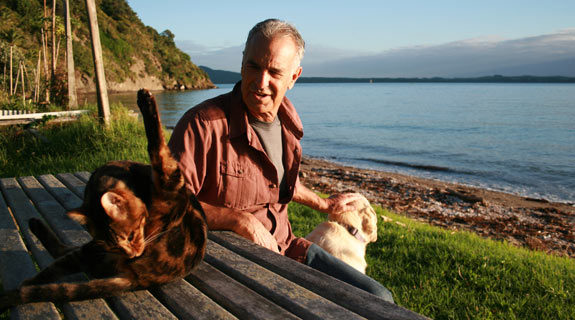Pet whisperer Jeffery Masson has been writing best-sellers on animal psychology from his East Auckland home for almost a decade. Sarah Lang discovers the secret life of our favourite pets.
Does your cat really love you? Can you disappoint your dog? Our pets are mysterious creatures with lives of their own and real emotions— some of them surprisingly similar to our own. Sarah Lang meets Jeffrey Masson, best-selling author and expert on the emotional lives of animals
PHOTO: Sarah Heeringa
Dusk in East Auckland’s Karaka Bay, and three cats—two white, one leopard-striped—trail a silver-haired man along the sand. It’s such an unusual sight that visitors stop and point, or call their kids over to look. For Jeffrey Masson, best-selling author and internationally renowned expert on animal emotions, it’s an everyday event.
Moko, Megala and Tamaiti like to slink along the beach with their housemate Jeffrey (who doesn’t believe you can ‘own’ a cat). Golden labrador Benji will always come for a walk if asked, even if he doesn’t feel like it, but the cats come only if they want to. “If you tell a cat to stay, well, good luck,” Jeffrey says.
Formerly a professor of Sanskrit, controversial psychoanalyst and Sigmund Freud Archives project director, the unorthodox scribe is currently writing his 26th book in as many years, The Dog Who Couldn’t Stop Loving: A 40,000-Year Romance (between dogs and humans, that is). Due out in 2010, it’ll be his tenth book on animals, including best-sellers When Elephants Weep, The Pig Who Sang to the Moon, The Nine Emotional Lives of Cats and million-copy-selling Dogs Never Lie About Love.
At 68, Jeffrey’s as brashly American as they come, with an expansive vocabulary and razor-sharp intellect (his home library has 14,000 books). After falling in love with New Zealand on a research trip, he made it his home at the turn of the millennium. But this month Jeffrey and family—German paediatrician Leila Siller, sons Ilan (12) and Manu (7)—are returning from the fringes of the world to what’s arguably its hub. “With Obama as president, it’s too exciting not to be there,” he says.
Jeffrey was a pioneer in the field of animal emotions in the early 80s, when the very notion was often ridiculed. That attitude’s changed, as awareness has trickled down from animal scientists and authors to pet owners. “But we still undervalue animals’ emotional lives,” says Jeffrey. “Animals have strong feelings and care about their lives and friendships as we do.”
Animal emotions are complex, extensive and specific to each species. Unlike humans (with the exception of our immediate primate relatives) animals don’t filter or fake emotion.
Each of Jeffrey’s books is based on anecdotes, and draws from literature, history and animal-behavioural research as well as his own studies of hundreds of animals throughout Europe, America and Australasia. But domestic animals, dogs and cats, have commanded the most attention. After all, they’re our beloved pets.
Only dogs surpass us in our ability to love, says Jeffrey. “It’s a very pure love: it’s not contingent, we don’t have to earn it.” His new book argues that dogs are the only non-human species that consistently forms close inter-species associations with other animals. “Dogs and humans do this all the time. I believe it’s because we’ve mutually reinforced each other to do it.”
Dogs’ other primary emotions, says Jeffrey, are fidelity, compassion, loneliness, disappointment, affection and gratitude. Although disappointment is a rather sophisticated emotion, it’s not the same as your wife saying ‘I’m disappointed in you,’ he says. A dog’s not disappointed in you, but just generally disappointed.
Of course, cats and dogs are worlds apart in nature. Cats are much more independent and spirited, dogs far more needy and transparent … right? “I do think dogs are more emotional than cats, albeit in different ways,” says Jeffrey. “You never hear of a guide cat; a cat’s not going to help someone cross the street. And if you’re playing too rough, a cat will sink its claws into you to discipline you, but a dog would never do that.”
Cats won’t do what you tell them unless they want to. They understand no “but just don’t care”, says Jeffrey, laughing about how his feline trio has shredded the fabric of his expensive reading chair not once but twice.
But while you can’t read them the way you can read dogs, cats also run the gamut of emotions. In The Nine Emotional Lives of Cats he outlines nine primary emotions: contentment, narcissism, love, attachment, jealousy, fear, anger, curiosity and playfulness. “And their profound self-sufficiency is almost another kind of emotion.”
Women often prefer cats to dogs, says Jeffrey, “because they admire that honesty and independent spirit. Men largely like to be obeyed, to be in control, and you can’t control a cat”.
Do our feline friends love us back? “Cats do, but it’s earned love and you can lose that.”
It would be a mistake to assume devotion, grief and great love are solely canine traits; cats feel loyalty, too. We’ve all heard stories of cats crossing vast distances to return home, so it’s no surprise that cats get attached to people as well as places. But who knew they felt pride? When Jeffrey began showing potential buyers around his house, his cat Megala never failed to turn up and lead the way.
As tour guide, Megala was proud but not desperate to please. After all, you never hear about a cat with a self-esteem problem.
Reading books about their evolution is one way we can better understand our pets and see them in a more three-dimensional way, says Jeffrey. “Try to give them whatever it is they’d require in the wild. A dog’s never going to be happy staying home all day without anyone there and no chance to wander or walk. With cats it’s not hard, as long as you don’t keep them locked up in the house … I feel if we’re going to take an animal into our homes, we have an obligation to give them as good a life as possible.”
“The heart of any relationship with a domestic animal, dog or cat, is to be playful with them, be part of their world, and be constantly positive.” Make time to walk them, pet and play with them, advises Jeffrey. “Imagine if you never played with your kids—my kids would complain. Dogs never complain, but they feel it.”
Should we spend more time with cats, too? “They’re the ones deciding how much time to spend with us,” he laughs.
But beware of categorising cats and dogs. Don’t only curl up with your cat on the sofa; don’t only walk your dog. Instead, observe their individual preferences. “We have too many handed-down pieces of wisdom … about what animals do and don’t do. Too often our human prejudices get in the way of what our heart’s telling us. So if you discover your cat wants to do a certain thing and you think cats aren’t supposed to do that, do it anyway! Be kind to this animal, be a friend, let him be part of your family.”
As you see the cats follow him along the beach, you know Jeffrey’s practising what he preaches.







